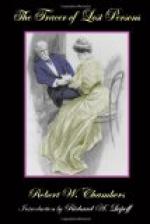“This is the same papyrus,” he said. “I had forgotten that I carried it away with me until I found it in my shooting coat while packing to sail for New York.”
The Tracer of Lost Persons reached over and picked up the scroll. It was flexible still, but brittle; he opened it with great care, considered the strange figures upon it for a while, then turned almost sharply on his visitor.
“Go on,” he said.
And Burke went on:
“The candle was burning low; I lighted two more, placing them at her head and feet on the edges of the stone couch. Then, lighting a third candle, I stood beside the couch and looked down at the dead girl under her veil-like robe, set with golden stars.”
He passed his hand wearily over his hair and forehead.
“I do not know what the accepted meaning of beauty may be if it was not there under my eyes. Flawless as palest amber ivory and rose, the smooth-flowing contours melted into exquisite symmetry; lashes like darkest velvet rested on the pure curve of the cheeks; the closed lids, the mouth still faintly stained with color, the delicate nose, the full, childish lips, sensitive, sweet, resting softly upon each other—if these were not all parts of but one lovely miracle, then there is no beauty save in a dream of Paradise. . . .
“A gold band of linked scarabs bound her short, thick hair straight across the forehead; thin scales of gold fell from a necklace, clothing her breasts in brilliant discolored metal, through which ivory-tinted skin showed. A belt of pure, soft gold clasped her body at the waist; gold-edged sandals clung to her little feet.
“At first, when the stunned surprise had subsided, I thought that I was looking upon some miracle of ancient embalming, hitherto unknown. Yet, in the smooth skin there was no slit to prove it, no opening in any vein or artery, no mutilation of this sculptured masterpiece of the Most High, no cerements, no bandages, no gilded carven case with painted face to stare open eyed through the wailing cycles.
“This was the image of sleep—of life unconscious—not of death. Yet is was death—death that had come upon her centuries and centuries ago; for the gold had turned iridescent and magnificently discolored; the sandal straps fell into dust as I bent above them, leaving the sandals clinging to her feet only by the wired silver core of the thongs. And, as I touched it fearfully, the veil-like garment covering her, vanished into thin air, its metal stars twinkling in a shower around her on the stone floor.”
The Tracer, motionless, intent, scarcely breathed; the younger man moved restlessly in his chair, the dazed light in his eyes clearing to sullen consciousness.
“What more is there to tell?” he said. “And to what purpose? All this is time wasted. I have my work cut out for me. What more is there to tell?”
“What you have left untold,” said the Tracer, with the slightest ring of authority in his quiet voice.




